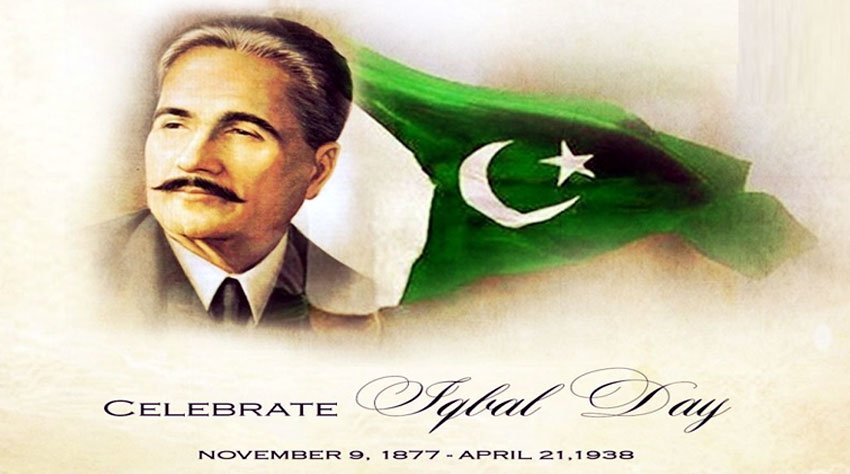Shazia Ramzan
Allama Muhammad Iqbal was born on November 9, 1877 in Sialkot, Punjab, in British India. He belonged to a Kashmiri Muslim family and received his early education in his hometown. He was interested in poetry, philosophy, and religion from a young age and learned Arabic, Persian, Urdu, and English languages. He completed his bachelor’s and master’s degrees in philosophy from Government College Lahore and then went to Europe for higher studies. He obtained another bachelor’s degree in philosophy from Cambridge University, a law degree from Lincoln’s Inn, and a doctorate in philosophy from Munich University. His doctoral thesis was titled “The Development of Metaphysics in Persia” and was published in 1908.
Iqbal returned to India in 1908 and started his career as a lawyer, teacher, and poet. He also became involved in politics and joined the Muslim League, the main political party of the Indian Muslims. He was elected to the Punjab Legislative Council in 1926 and represented the Muslims of India in the Round Table Conferences in 1930 and 1931. He was a strong advocate of the political and spiritual revival of the Muslim community and the preservation of their distinct identity and culture. He was also a visionary who foresaw the need for a separate homeland for the Muslims of India and articulated his idea of Pakistan in his famous Allahabad Address in 1930. He said:
“I would like to see the Punjab, North-West Frontier Province, Sind and Baluchistan amalgamated into a single State. Self-government within the British Empire, or without the British Empire, the formation of a consolidated North-West Indian Muslim State appears to me to be the final destiny of the Muslims, at least of North-West India.”
Please, subscribe to the monthly magazines of republicpolicy.com
Iqbal was not only a political thinker but also a great poet and philosopher. He wrote poetry in Urdu and Persian languages and expressed his views on various topics such as religion, Islam, Quran, philosophy, metaphysics, art, politics, law, economics, and universal brotherhood. He is widely regarded as the greatest Urdu poet of the 20th century and one of the most influential figures in Islamic literature and thought. He is also known as the “Poet of the East” and the “Spiritual Father of Pakistan”. Some of his famous works include Asrar-e-Khudi (The Secrets of the Self), Rumuz-e-Bekhudi (The Secrets of Selflessness), Payam-e-Mashriq (Message from the East), Zabur-e-Ajam (Persian Psalms), Javid Nama (The Book of Eternity), and Bang-e-Dara (The Call of the Marching Bell).
Iqbal’s philosophy was based on the concept of khudi, or selfhood, which he derived from the Quran and the teachings of the Prophet Muhammad (PBUH). He believed that the human self is a divine spark that can achieve the highest levels of excellence and perfection by following the path of love, action, and knowledge. He also believed that the self is not isolated but connected to the larger community and the ultimate reality of God. He said:
“The ultimate aim of the ego is not to see something, but to be something.”
Iqbal’s philosophy was also influenced by the works of various Western and Eastern thinkers, such as Rumi, Hafiz, Goethe, Nietzsche, Bergson, and Hegel. He tried to reconcile the rational and the mystical aspects of human nature and to create a synthesis of the modern and the traditional values. He also tried to address the challenges and opportunities faced by the Muslim world in the context of colonialism, nationalism, democracy, and globalization. He said:
“The essence of ‘Tauhid’ (monotheism) as a working idea is human unity, human equality and human freedom.”
Iqbal’s philosophy was not only theoretical but also practical and motivational. He used his poetry and prose to inspire and guide the Muslims of India and the world to awaken their dormant potential and to strive for their rights and dignity. He also communicated his vision and advice to his political colleague and friend, Quaid-e-Azam Muhammad Ali Jinnah, who was the leader of the Pakistan Movement and the founder of Pakistan. Iqbal encouraged and supported Jinnah to take up the cause of the Muslim nation and to lead them to their destiny. He said:
“I know you are a busy man but I do hope you won’t mind my writing to you often, as you are the only Muslim in India today to whom the community has a right to look up for safe guidance through the storm which is coming to North-West India and, perhaps, to the whole of India.”
Iqbal died on April 21, 1938 in Lahore, Punjab, nine years before the creation of Pakistan. He was buried near the Badshahi Mosque and his tomb is a national monument and a place of pilgrimage for his admirers. His legacy lives on in the hearts and minds of millions of people who cherish his poetry, philosophy, and vision. He is widely celebrated as the national poet of Pakistan and his birthday, November 9, is observed as Iqbal Day. He is also He is also honored and respected in many other countries, especially Iran, Turkey, Afghanistan, and Central Asia, where his works have been translated and studied extensively. He is regarded as one of the greatest thinkers and poets of the Muslim world and a source of inspiration and guidance for the present and future generations. He said:
“Rise above sectional interests and private ambitions… Pass from matter to spirit. Matter is diversity; spirit is light, life and unity.”
Therefore, the nation salutes the vision and philosophy of Iqbal and 9th November, is celebrated as Iqbal day in Pakistan.
Please, subscribe to the YouTube channel of republicpolicy.com
















